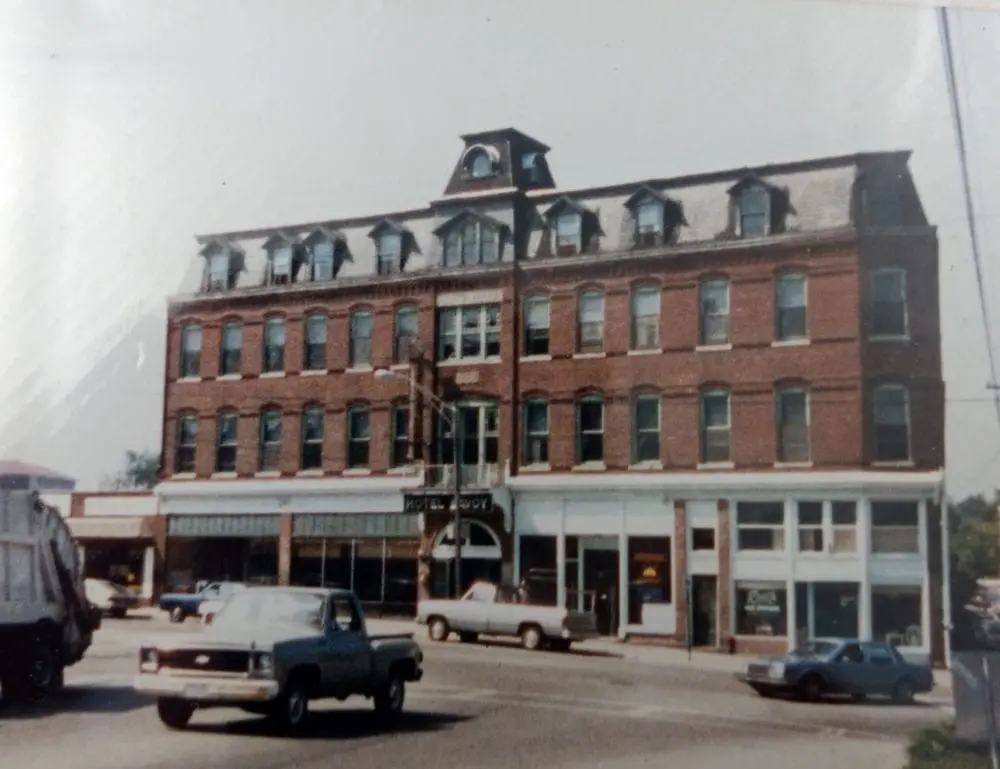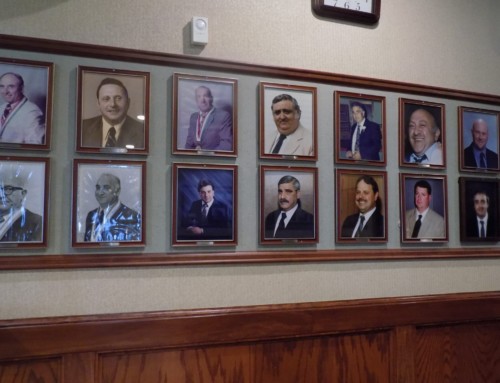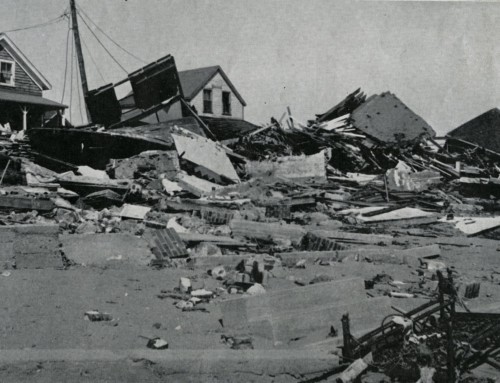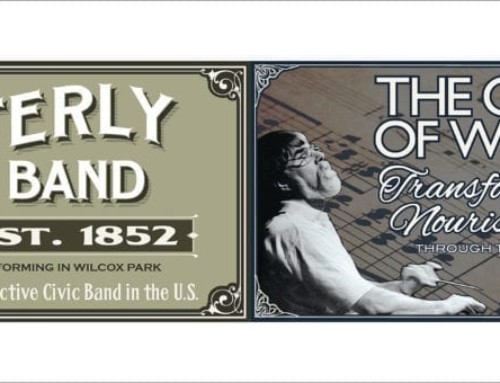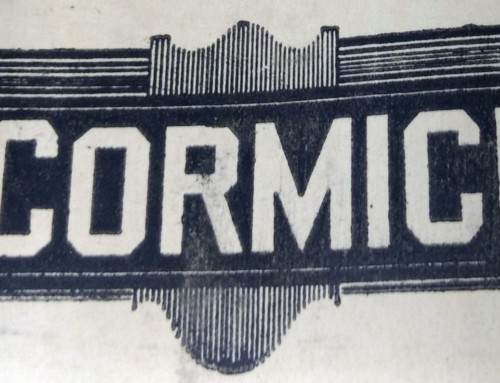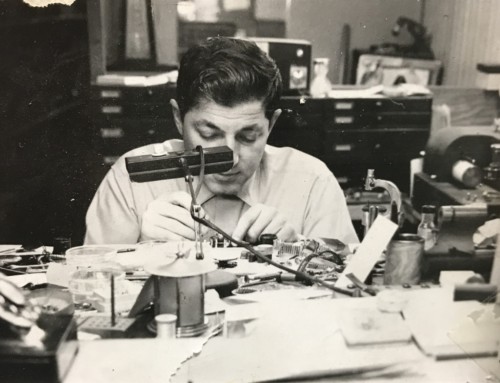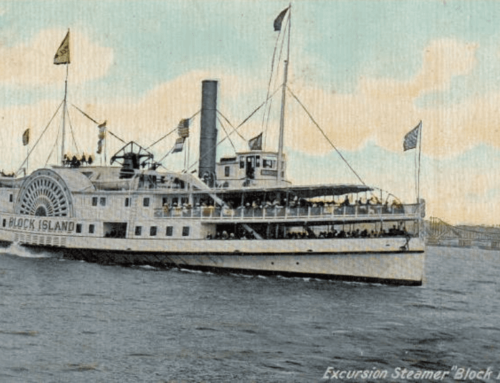In March 2016, the Savoy Bookshop and Café opened in downtown Westerly, completing the long-awaited and much-needed facelift of the Martin House, a building that has been a fixture on Canal Street for more than 125 years.[1] Over the course of its history, the Martin House has been the site of a wide array of businesses including hotels, pharmacies, and restaurants. Today, after extensive renovations, the building is considered by many to be a gem of the downtown area.
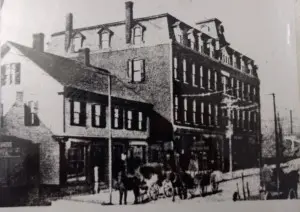
The hotel officially opened for business on September 19, 1889, when Michael Martin invited the public to view the property while offering cigars to all who wished to partake.[4] Martin had owned the land since purchasing it from Horatio N. Campbell on November 18, 1880,[5] and Campbell had purchased the land from Pardon Lewis on December 9, 1863.[6]
According to an 1892 advertisement, the hotel was new and “just opened.” The advertisement also noted that the hotel had 42 bedrooms, large parlors, a billiard room, and was lighted by gas and heated by steam.[7] A room at the Martin House would cost a traveler $2 (approximately $54 in 2022), while dinner would run them 50 cents (approximately $13.50).[8] Interestingly, the hotel offered special rates for ‘dramatic companies.’[9]
By 1895, Martin began leasing out the building and it became known as the Foster House.[10] During these early years, a man named John Linden owned and operated the Foster House Pharmacy on the building’s first floor, while the remainder of the building served as the hotel.[11] The hotel’s proprietors at this time were listed as J.H. and D. Carley. A brief review of the hotel made note of their high-quality service as well as cuisine which compared positively to any other fine hotel. The building’s location across from the train depot was often cited as an advantage.[12]
An advertisement for the Foster House Hotel published in 1896, claimed that for either $2 or $2.50, you could rent a room ($60 and $75 respectively in 2022) which was heated by steam and lighted by gas.[13] Despite only being eight years old, the rooms were advertised as “lately renovated and refurnished.”[14] While staying at the hotel, one could easily contact David Carley, the hotel’s proprietor, as rooms were equipped with electric return call bells.[15]
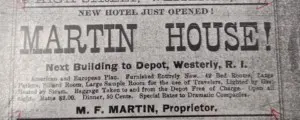
The police apparently felt it was time to crack down on the illegal practice and the hotel was targeted.[16] Altogether, 20 men were arrested and $400 ($12,151 in 2022) was seized from the hotel. The raiding party was led by Dr. B.L. Lewis, a member of the Westerly Town Council This caused a scandal due to the fact that the hotel’s landlord, Frank B. Cook, was also a councilman in Westerly.[17] Cook resigned the following morning at the town council’s monthly meeting,[18] and in October 1897, Cook sold all of his right and title in the property to F.C. Sheldon of Providence.[19]
After just two years of ownership, Sheldon determined that there was not enough financial incentive to continue operation of the Granite City Hotel and on August 12, 1899, he closed the doors for the final time.[20] After closing the hotel, Sheldon continued to use the building as a lodging house for men only, with rooms being available by the day or week.[21]
Shortly thereafter, the lease was given up to a Thomas Gaffney of New London. Gaffney then arranged for Mrs. Mary F. Martin, widow of Michael F. Martin, to reopen the hotel on October 1.[22] Martin tasked a Boston hotel manager with running the reopened Martin House and located the hotel’s office in the space occupied by the Westerly Drug Company.[23]
Over the course of its history, the hotel experienced its share of fires, most of which caused little to no damage. In August 1898, a small fire was discovered at the hotel and “caused much excitement during the night among the guests in the house.” The damage, however, was minimal.[24] On May 7, 1911, a fire was discovered in the hotel’s barroom after a lit cigarette was thrown on the sawdust-covered floor, however, a timely discovery prevented any notable damage.[25]
The building’s most noteworthy fire, however, took place on August 1, 1951. At about noon on that day, a fire was ignited when some kindling in the basement became inflamed. The fire quickly climbed the elevator shaft, and three people had to be removed from the third and fourth floors by ladder.[26] More than a thousand people gathered on Canal Street to watch as the guests were extracted from the building. The damage to the structure was assessed at $10,000. The businesses on the first floor, including the Jack and Harry Store, the Mansfield Bar and Grill, and Spaghetti and Chip House also incurred losses.[27]
From 1910 to 1919, Andrew J. Martin, son of Michael F. and Mary Martin, operated the hotel until control was once again ceded to his mother, Mary Graf, formerly Martin, who served as proprietor until 1933, when Andrew took over for a final time.[28]
On October 20, 1939, Andrew J. Martin officially closed the Hotel Martin with the bar and grill room having closed the day prior. At the time of its closing, the 50-room hotel had been continuously serving in that capacity since its construction in 1888.[29] The hotel has been owned by Mrs. Mary Graf until her death in February 1939. While the death of Mary Graf certainly played a role in the hotel’s closing, Andrew J. Martin claimed that the shutdown of the hotel was “for none of the usual reasons.”[30] When the Westerly Sun reported on the closing, they noted that the Hotel Martin “catered to middle-class families and held a good reputation in Rhode Island hotel circles.”[31]
The building’s inactivity was relatively short-lived, however, as the Martin House was purchased by Emanuel Mandel of Norwich on January 21, 1943. At one time, Mandel had operated a hotel in Miami, Florida, and was therefore familiar with the business. The building was sold for $22,500 ($335,700 in 2022) and upon being reopened, was christened the Hotel Delman, a name he chose by reversing the syllables in his surname.[32] The reopening of the hotel was lauded, as there was a housing shortage in Westerly at the time.[33]
It was not long after its opening before the Hotel Delman ran afoul of the law. On May 31, 1943, Westerly police raided the hotel “looking for tangible evidence that would back up the reputation the place has gained.”[34] As a result of the raid, Mandel was charged with “maintaining a common nuisance.”[35] Overall, 10 people were arrested, six of whom were released after questioning.
The four who were held, included Mandel, William McGrane, a night clerk who was charged with “receiving certain persons in the Delman Hotel for lewd and indecent acts,” as well as two women who pleaded not guilty to ‘moral charges.’[36] The raid was conducted by plainclothes officers and was assisted by Rhode Island State Police, shore patrol officers, and military police from Niantic, Connecticut.[37]
Mandel’s ownership of the property was relatively brief, ending when he sold the property to Maria Rose Mastrandrea on May 3, 1945, after just over two years in operation.[38] While Mastrandrea initially maintained the Hotel Delman name, it was announced on July 2, 1945, that the business would operate under the name Hotel Westerly and would be managed by Maria’s son, John.[39] Early on, business was quite good for the hotel, as John Mastrandrea recalled in a 1993 interview: “I remember times when we [the owners] would turn 300 people away for the weekend.”[40]
In 1954, the Hotel Westerly advertised rooms at a rate of $2 and $3 ($18.75 and $28.12 in 2022), which included those “with and without bath.” The hotel also boasted ‘fine food’ and that they were the “only hotel in town with elevator service.”[41] On May 16, 1955, the Hotel underwent a final name change, becoming the Hotel Savoy.[42] The explanation for the change was that it was to preserve the hotel’s reputation. There was often confusion when reporters mentioned that tourists who caused trouble were “customers of a Westerly hotel,” with many incorrectly assuming this meant the Hotel Westerly.[43]
At the time of the change, the hotel contained 40 rooms and four apartments.[44] The new name was chosen by Maria Mastrandrea as a tribute to the royal family in Italy before World War I, specifically, King Victor Emmanuel who was the head of the House of Savoy.[45]
The Mastrandrea family continued to own and operate the hotel for many years. Through a series of transactions, the Martin House eventually came into the possession of neurologist Carlo Brogna and his Downtown Group LLC which purchased the property in 2000 for $325,000.[46] In 2007, Brogna announced that after renovations to the building, high-end housing units would be made available for purchase.[47]
In 2013, the group 10 Canal Street LLC, headed by local philanthropist Charles M. Royce, purchased Units 10A and 10B from the Downtown Group,[48] and in April 2016, the centerpiece of the renovated Martin House, Savoy Bookshop and Café, was officially opened for business.
Despite its history filled with both ups and downs, the Martin House remains one of Westerly’s most remarkable buildings and stands as a monument to the town’s history as a travel destination. Today, the building is also a major part of the efforts to revitalize downtown Westerly and has become a great example of a modern space in a historic venue.
[su_accordion class=””] [su_spoiler title=”Footnotes” open=”no” style=”default” icon=”plus” anchor=”” class=””]
[1] Nilsson, Casey, “New Bookstore Alert: Savoy Bookshop Opens in Westerly” Rhode Island Monthly, 29 March 2016.
[2] National Register of Historic Places Inventory-Nomination Form, Westerly Downtown Historic District, 1978, pg. 6.
[3] Parsekian, Penny, “Owners glimpse into landmark’s past: The Savoy is for sale” Westerly Sun: Places in the Sun, 19 February 1993, pg. 1.
[4] Westerly Weekly, 26 September 1889, “The Martin House”
[5] Westerly Land Deeds, Book 25, pgs. 90-91.
[6] Westerly Land Deeds, Book 21, pgs. 143-144.
[7] Westerly City Director, 1892, Martin House advertisement.
[8] Westerly City Director, 1892, Martin House advertisement.
[9] Westerly City Director, 1892, Martin House advertisement.
[10] “Hotel Martin Landmark For 50 Years Closes Doors Tonight” Westerly Sun, 20 October 1939, and National Register of Historic Places Inventory-Nomination Form, Westerly Downtown Historic District, 1978, pg. 6.
[11] Sixth Annual Report of the State Board of Soldiers’ Relief, (Providence, RI, 1895), pg. 10.
[12] Foster House advertisement, source unknown, courtesy of Westerly Library Local History Collection.
[13] Westerly City Director, 1896, Foster House advertisement.
[14] Westerly City Director, 1896, Foster House advertisement.
[15] Westerly City Director, 1896, Foster House advertisement.
[16] “Hotel Bars Raided” Waterbury Democrat (CT), 3 May 1897, pg. 2.
[17] “Raided Fellow Councilman” Boston Globe, 3 May 1897, pg. 2.
[18] “Councilman F.B. Cook Resigned” The Boston Globe, 4 May 1897, pg. 7.
[19] “Change in Landlords” Westerly Sun, 15 October 1897.
[20] “Granite City Hotel Closed” Westerly Sun, 13 August 1899.
[21] “Granite City Hotel Closed” Westerly Sun, 13 August 1899.
[22] “Hotel to Reopen” Westerly Sun, 3 September 1899.
[23] “The Granite City Hotel” Westerly Sun, 2 October 1899.
[24] Fibre and Fabric, No. 702, Vol. XXVII, 13 August 1898, pg. 303.
[25] Norwich Morning Bulletin, 8 May 1911, pg. 7.
[26] “Hotel Westerly Guests Flee Fire” Providence Journal, 1 August 1951, pg. 2.
[27] “Hotel Westerly Guests Flee Fire” Providence Journal, 1 August 1951, pg. 2.
[28] “Hotel Martin Landmark For 50 Years Closes Doors Tonight” Westerly Sun, 20 October 1939.
[29] “Hotel Martin Landmark For 50 Years Closes Doors Tonight” Westerly Sun, 20 October 1939.
[30] “Hotel Martin Landmark For 50 Years Closes Doors Tonight” Westerly Sun, 20 October 1939.
[31] “Hotel Martin Landmark For 50 Years Closes Doors Tonight” Westerly Sun, 20 October 1939.
[32] “Martin House Deed Filed” Westerly Sun, 22 January 1943.
[33] “Martin House Deed Filed” Westerly Sun, 22 January 1943.
[34] “Several Held in Raid on Delman Hotel” Westerly Sun, 1 June 1943.
[35] “Several Held in Raid on Delman Hotel” Westerly Sun, 1 June 1943.
[36] “Several Held in Raid on Delman Hotel” Westerly Sun, 1 June 1943.
[37] “Several Held in Raid on Delman Hotel” Westerly Sun, 1 June 1943.
[38] “Delman Hotel Property Sold” Westerly Sun, date unknown and Westerly Land Deeds, vol. 63, pg. 23.
[39] “Hotel Named for Westerly” Westerly Sun, 2 July 1945.
[40] Parsekian, Penny, “Owners glimpse into landmark’s past: The Savoy is for sale” Westerly Sun: Places in the Sun, 19 February 1993, pg. 1.
[41] Westerly City Director, 1954, Hotel Westerly advertisement.
[42] “Canal Street Hotel to Be Known as ‘Savoy’” Westerly Sun, 16 May 1955.
[43] “Canal Street Hotel to Be Known as ‘Savoy’” Westerly Sun, 16 May 1955 and Parsekian, Penny, “Owners glimpse into landmark’s past: The Savoy is for sale” Westerly Sun: Places in the Sun, 19 February 1993, pg. 1.
[44] “Canal Street Hotel to Be Known as ‘Savoy’” Westerly Sun, 16 May 1955
[45] Parsekian, Penny, “Owners glimpse into landmark’s past: The Savoy is for sale” Westerly Sun: Places in the Sun, 19 February 1993, pg. 1.
[46] Russell, Gloria, “A New Day for the Old Savoy” Westerly Sun, 14 July 2007.
[47] Russell, Gloria, “A New Day for the Old Savoy” Westerly Sun, 14 July 2007.
[48] Westerly Land Deeds, vol. 2013, pg. 11945.
[/su_spoiler] [/su_accordion]
